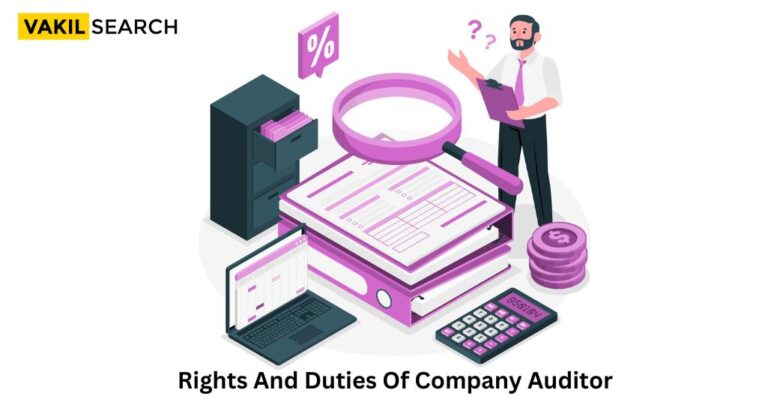This informative blog will educate you about the ins and outs of how a statutory auditor is appointed in India, as well as its roles and responsibilities.
Every business established under the 2013 Companies Act is required to compile books of accounts, financial statements, and papers for each fiscal year, and these books must be audited by a statutory auditor designated by the company for this particular purpose. The appointment of such auditors is controlled by the 2013 Companies Act (Section 139), as amended by the 2014 Companies (Audit and Auditors) Rules.
So, Who’s a Statutory Auditor?
In our country the term “statutory auditor” talks about an external auditor. A “statutory audit” is basically a legally mandated evaluation of the quality of a government’s or company’s accounting information. The goal of a statutory audit is the same as any other purpose of audit – to determine if a business provides a thorough and truthful depiction of its financial situation by evaluating details such as accounting reports, financial statements, and bank accounts.
A statutory auditor is generally an official and approved service provider who certifies financial statements in accordance with appropriate professional auditing standards like INSTOSAI, ACCA, and ACA. A statutory auditor must be recognised as a CA (Chartered Accountant) as per the 1949 Chartered Accountant Act. According to the regulations of the 2013 Companies Act, every firm must appoint a statutory auditor to evaluate and verify accounting information.
Statutory Auditor: Appointment
The first auditor of the company must be chosen by the board of directors within 30 days of the company incorporation or registration, according to Section 139 of the Companies Act, 2013.
If the auditor is not appointed, the board of directors must notify the shareholders, who must then call an extraordinary general meeting within 90 days of receiving the notification from the board and select the first auditor. The auditor in question shall serve until the end of the first annual general meeting. A future auditor will be selected by the shareholders at the first annual general meeting and will serve for a period of five years.
Within 15 days following the appointment, the firm must additionally file a notice of such appointment in Application Form ADT-1 with the Registrar.
Statutory Auditor Appointment: In Case of a Government Company
In the case of a government company, the first auditor must be appointed by the Controller and Auditor General of India within sixty days of the firm’s establishment or registration.
In the event that the auditor is not appointed, the board of directors must appoint the first auditor within the following 30 days. If the board fails to nominate within 30 days, they must notify shareholders, who must then convene an extraordinary general meeting within 60 days after receiving notification from the board to select the first auditor.
The auditor in question shall serve until the end of the first annual general meeting. The Controller and Auditor General of India will appoint a subsequent auditor within 180 days of the start of the fiscal year till the end of the annual general meeting.
Statutory Auditor Appointment: In the Case of Casual Vacancy
A casual vacancy may develop as a result of:
- The Auditor Has Died
- Auditor’s Disqualification
- Auditor’s Resignation
Casual vacancies must be filled by the Board of Directors within thirty days, and if the vacancy is based on resignation, it must be replaced by the Board of Directors and authorised by shareholders within three months.
Term of an Auditor
Companies in the following categories:
- Every listed company
- Every unlisted public firm with a paid-up share capital of at least ₹10 crore
- Every private enterprise has a paid-up capital of at least ₹50 crores
All firms with paid-up share capital less than the threshold limit specified in points (2) and (3) but with deposits and public borrowings of ₹50 crores or over are not permitted to re-appoint or appoint:
- a person as an auditor for over a five-year term;
- an audit firm auditor for over two five-year periods.
Form of Auditor Rotation
Where a firm is required to form an Audit Unit, the board shall examine the recommendations of such a committee; otherwise, the board shall evaluate the issue of auditor rotation and make a recommendation to the members at the annual general meeting for the appointment of the following auditor.
- In the event of an auditor (whether an individual or an audit company), the time for which the individual or firm held office as auditor previous to the beginning of the Act should be taken into consideration when determining the period of 5 or 10 consecutive years.
- The incoming auditor or audit firm shall not be qualified if it is affiliated with the outgoing audit firm or auditor through the same audit firm network.
Statutory Auditor: Duties and Responsibilities
A statutory auditor’s role should ideally encompass the following functions:
- Make Inquiries
Well, one of the most important tasks of the auditor is to ask questions when he or she sees fit. A branch auditor is in charge of all tasks and obligations at the branch level, as well as submitting the audit report to the company’s auditor for evaluation.
- Provide an Audit Report
The purpose of hiring an external auditor is to perform an unbiased audit. This is independent of any internal ties inside the organisation. As a result, in order to work as an auditor, one must be a chartered accountant. Assume, however, that a corporation hires an LLP to serve as its auditor. In that instance, the CA partners are authorised to act as auditors and have the authority to sign on the firm’s behalf.
- Fraud Reporting
Since an auditor examines a company’s records of finances, he may come across a fraudulent transaction on occasion. This is justification enough for the auditor to suspect that someone committed fraud against the organisation.
Because the books of accounts are kept by the company’s authorities, the auditor must conclude that some of the employees committed fraud. In such cases, he must reveal the copy to the central government or, in the case of the Company, the Board of Directors.
- Maintain Confidentiality and Integrity
An auditor must learn to conceal their identity. As an auditor, he has access to sensitive corporate information, which he must not expose to anybody without the firm’s express authorisation. Furthermore, when auditing the accounts, the auditor must be truthful.
How Businesses Can Benefit by Appointing a Statutory Auditor?
Businesses can benefit a lot if they appoint a statutory auditor. Take a look at the following points to learn more about it in detail and depth:
- Increased Business Credibility
Appointing a statutory auditor to undertake a comprehensive audit of the books of accounts boosts the business’s reputation and authenticity. Because the books of accounts are examined by a licenced auditor, the firm may obtain loans more quickly and raise capital more effectively.
- Meeting Statutory Requirements
The appointment of a statutory auditor ensures that all statutory accounting obligations are completed. The management may be certain that they have carried out their statutory and non-statutory tasks, such as corporate governance.
- Regulation of Internal Controls
The auditor provides input on the organisation’s internal control by completing a statutory audit. This assists the organisation in reducing risks and improving performance.
- Fair and True Picture of the Company’s Business
A statutory auditor gives a fair and true image of the company’s business and financial status to internal management together with outsiders like potential investors through his or her audit procedure.
Conclusion
Statutory audits ensure tax compliance by researching and reviewing accounting systems and tax control units in order to reduce taxes. A statutory auditor’s responsibilities include maintaining necessary tax documentation, assisting businesses with tax returns, and preparing tax audit reports.
The auditor typically streamlines the job and tax records and ensures that the organisation adheres to tight laws. If the auditor discovers that the firm has falsified records, the auditor has the authority to revoke the company’s licence. To conduct an accurate audit, the organisation must ensure that all government laws and regulations are followed.
If you want to learn more about Statutory auditors or require the assistance of any top-notch legal professional, you can simply reach out to Vakilsearch without any hesitation.
Also Read:
- What Are the Practical Steps in a Statutory Audit ?
- What is the Difference Between Tax Audit and Statutory Audit of a Company ?










